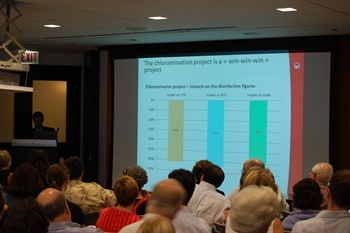On Tuesday evening I had the chance to talk about a broad array of water issues with some students at Archeworks. One unhappily described increases in his water bill over the past few years, without any real change or improvements in water quality or infrastructure that might justify it. I asked him whether his electric bill or the cost of gas for his car had gone up over the same period, to which the answer is of course 'yes', and he was able to put two and two together.
As energy costs increase, so do water costs, because you need a lot of power to pump, treat, distribute, collect, and clean all the water we use. At the same time, it takes a lot of water to cool the machinery needed to produce all that power, and in the case of biofuels, it takes even more water to grow all of the crops. As we mine our deep aquifers more and more, or impair source water quality, the amount of energy needed to extract and treat that water increases, requiring more energy, and more water to make that energy. It's one big circular mess.
The good news is that people are starting to take this interconnected problem seriously, but the bad news is that the problem is getting worse. Last Tuesday more than 100 utility experts, policy makers, and concerned citizens attended "Down the Drain, Up in Smoke: Exploring the Water-Energy Nexus in the Chicago Region," the second roundtable in MPC and Openlands' summer series on choosing a more sustainable path for water resources management.
Michael Webber, the nation's leading expert on the water-energy nexus, outlined the myriad drivers of increased energy and water consumption:
- total population growth
- increased quality of life
- policy shifts toward more water-intensive energy (e.g. biofuels and nuclear) and energy-intensive water (e.g. increased wastewater treatment and desalination of sea water)
- climate change
- long-haul pipelines
More importantly, Webber described an array of opportunities to address the problem (and here he does it again in a 90-second video we put together). Of particular interest was the energy demand for treating wastewater back to potable standards was comparable (and in some cases, somewhat lower) than pumping and treating deep groundwater. "Toilet to tap" isn't exactly a new idea—pretty much every downstream community out there gets to use whatever its upstream neighbor sends its way.

Frank Benichou, Executive Vice President and Chief Technical Officer at Veolia Water North America then walked everyone through Veolia's new Water Impact Index, which aims to move beyond the basic volumetric assessment of water use to incorporate energy consumption, carbon emission, and effects on the water source in question. Public and private water and wastewater utilities need to more thoroughly assess the full environmental effects and costs of different water management scenarios, and the Water Impact Index is a significant step in that direction. Watch this video of Benichou explaining the Water Impact Index.
Policy making is only now starting to catch up. In Washington, D.C., the recently-introduced Clean Energy Jobs and Consumer Savings Act (which is a subsection of the Clean Energy Jobs and Oil Accountability Act of 2010) would create the Home Star Retrofit Act to improve residential energy and water efficiency by providing funding for water conservation efforts nationwide and, for the first time in history, prominently places water efficiency incentives side-by-side with energy efficiency incentives in federal legislation. Some specifics include a $150 rebate for homeowners that purchase at least $300 in WaterSenseproducts (e.g. showerheads, toilets, faucets, and outdoor irrigation retrofit services), and a $500 rebate for homeowners that cut household water consumption 20 percent.
Here in Illinois, MPC and several partners tried and failed to create ties between water efficiency and energy efficiency earlier this year... hopefully the uptick in federal interest will help us get over the hump in Springfield next year. More immediately, we're hopeful that we can get get enough support during the fall veto session to move Ill. Senate Bill 2549: Rainwater Harvesting for Non-Potable Uses through the House. Catching runoff, storing it in a cistern, and using it to flush your toilet requires almost no energy and just makes sense. Check back this fall to see how you can help.